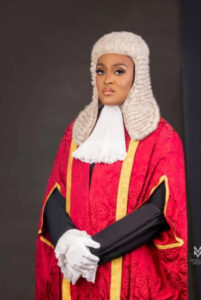Njideka Iheme, daughter of former Rivers State Governor, Peter Odili and Justice Mary Odili, has been sworn in as a Judge of the Federal High Court.
The Chief Justice of Nigeria, Honourable Justice Ibrahim Tanko Muhammad, swore in Mrs Iheme and and 20 others as Judges of the Federal Capital Territory High Court, on Tuesday 23rd November 2021.
Justice Njideka is married Uzoma Nwosu Iheme, the son of Court of Appeals Judge, Justice Chioma Nwosu Iheme.
![]()
The High court has unlimited jurisdiction to hear and determine any civil and criminal proceedings under any law of the state. There is a Sharia Court of Appeal and a Customary Court of Appeal for any State that requires any of them.
The federal high court in Nigeria composition is the Chief Justice, and the President of the Court of Appeal, and the two Chief Judges of the two high courts, including four but not more than eleven other judges.
All the proceedings carried out in the high court are done according to what Section 74 of the Courts of Judicature Act 1964 prescribed.
The high court of Nigeria can make laws, just like is done in the legislature. In the case of high court, sometimes, it can make laws via the decisions it has taken.
In most cases too, high court’s decision can to a large extent the nature of laws that the legislature has passed. There is no doubt that, the high court do interpret the laws made by the legislature, but even at that, this very function of interpreting these laws can be referred to as lawmaking by the high court.
Every citizen of Nigeria has a constitutional right to seek protection from the high court, should his or her right be threatened or violated by some other member of the public, since one of the functions of the high court is to protect humans’ rights.
This of course, defined one of the roles played by the high court of Nigeria in safeguarding citizens’ rights. Foreigners do have this same right so far as they lived within the shores of Nigeria.


